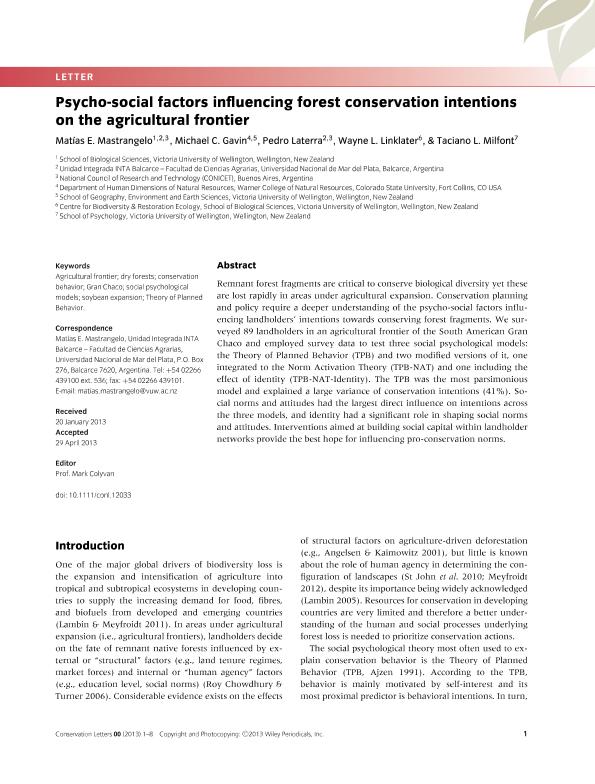Mostrar el registro sencillo del ítem
dc.contributor.author
Mastrangelo, Matias Enrique

dc.contributor.author
Gavin, Michael C.
dc.contributor.author
Laterra, Pedro

dc.contributor.author
Linklater, Wayne L.
dc.contributor.author
Milfont, Taciano L.
dc.date.available
2017-10-02T18:39:54Z
dc.date.issued
2013-06-03
dc.identifier.citation
Mastrangelo, Matias Enrique; Gavin, Michael C.; Laterra, Pedro; Linklater, Wayne L.; Milfont, Taciano L.; Psycho-social factors influencing forest conservation intentions on the agricultural frontier; Wiley Blackwell Publishing, Inc; Conservation Letters; 7; 2; 3-6-2013; 103-110
dc.identifier.issn
1755-263X
dc.identifier.uri
http://hdl.handle.net/11336/25624
dc.description.abstract
Remnant forest fragments are critical to conserve biological diversity yet these are lost rapidly in areas under agricultural expansion. Conservation planning and policy require a deeper understanding of the psycho-social factors influencing landholders’ intentions towards conserving forest fragments. We surveyed 89 landholders in an agricultural frontier of the South American Gran Chaco and employed survey data to test three social psychological models: the Theory of Planned Behavior (TPB) and two modified versions of it, one integrated to the Norm Activation Theory (TPB-NAT) and one including the effect of identity (TPB-NAT-Identity). The TPB was the most parsimonious model and explained a large variance of conservation intentions (41%). Social norms and attitudes had the largest direct influence on intentions across the three models, and identity had a significant role in shaping social norms and attitudes. Interventions aimed at building social capital within landholder networks provide the best hope for influencing pro-conservation norms.
dc.format
application/pdf
dc.language.iso
eng
dc.publisher
Wiley Blackwell Publishing, Inc

dc.rights
info:eu-repo/semantics/openAccess
dc.rights.uri
https://creativecommons.org/licenses/by-nc-sa/2.5/ar/
dc.subject
Agricultural Frontier
dc.subject
Dry Forests
dc.subject
Conservation Behavior
dc.subject
Gran Chaco
dc.subject
Social Psychological Models
dc.subject
Soybean Expansion
dc.subject
Theory of Planned Behavior
dc.subject.classification
Bioquímica y Biología Molecular

dc.subject.classification
Ciencias Biológicas

dc.subject.classification
CIENCIAS NATURALES Y EXACTAS

dc.title
Psycho-social factors influencing forest conservation intentions on the agricultural frontier
dc.type
info:eu-repo/semantics/article
dc.type
info:ar-repo/semantics/artículo
dc.type
info:eu-repo/semantics/publishedVersion
dc.date.updated
2017-09-29T14:43:09Z
dc.journal.volume
7
dc.journal.number
2
dc.journal.pagination
103-110
dc.journal.pais
Estados Unidos

dc.journal.ciudad
Malden
dc.description.fil
Fil: Mastrangelo, Matias Enrique. Victoria University of Wellington; Nueva Zelanda. Instituto Nacional de Tecnología Agropecuaria; Argentina. Universidad Nacional de Mar del Plata. Facultad de Ciencias Agrarias; Argentina. Consejo Nacional de Investigaciones Científicas y Técnicas; Argentina
dc.description.fil
Fil: Gavin, Michael C.. Colorado State University; Estados Unidos. Victoria University of Wellington; Nueva Zelanda
dc.description.fil
Fil: Laterra, Pedro. Universidad Nacional de Mar del Plata. Facultad de Ciencias Agrarias; Argentina. Instituto Nacional de Tecnología Agropecuaria; Argentina
dc.description.fil
Fil: Linklater, Wayne L.. Victoria University of Wellington; Nueva Zelanda
dc.description.fil
Fil: Milfont, Taciano L.. Victoria University of Wellington; Nueva Zelanda
dc.journal.title
Conservation Letters
dc.relation.alternativeid
info:eu-repo/semantics/altIdentifier/url/http://onlinelibrary.wiley.com/doi/10.1111/conl.12033/abstract
dc.relation.alternativeid
info:eu-repo/semantics/altIdentifier/doi/http://dx.doi.org/10.1111/conl.12033
Archivos asociados
